- Home
- Stephenie Meyer
The Chemist Page 2
The Chemist Read online
Page 2
She stood back and gave the decoy a once-over through half-closed eyes. It wasn't her best work, but it did look like someone was asleep in the bed. Even if an intruder didn't believe it was Chris, he would still have to neutralize the sleeping body before he went on to search for her.
Too tired to change into her pajamas, she just stepped out of her loose jeans. It was enough. She grabbed the fourth pillow and pulled her sleeping bag out from under the bed; they felt bulkier and heavier than usual. She dragged them into the compact bathroom, dumped them in the tub, and did the bare minimum of ablutions. No face-washing tonight, just cleaning the teeth.
The gun and the gas mask were both under the sink, hidden beneath a stack of towels. She pulled the mask over her head and tightened the straps, then clapped her palm over the filter port and inhaled through her nose to check the seal. The mask suctioned to her face just fine. It always did, but she never let familiarity or exhaustion make her skip the safety routine. She moved the gun into the wall-mounted soap dish within easy reach above the bathtub. She didn't love the gun--she was a decent shot compared with a totally untrained civilian, but not in the same class as a professional. She needed the option, though; someday her enemies were going to figure her system out, and the people coming for her would be in gas masks, too.
Honestly, she was surprised her shtick had saved her this long.
With an unopened chemical-absorption canister tucked under her bra strap, she shuffled the two steps back into the bedroom. She knelt beside the floor vent on the right side of the bed she'd never used. The vent cover grille probably wasn't as dusty as it should be, the grille's top screws were only halfway in, and the bottom screws were missing altogether, but she was sure no one looking through the window would notice these details or understand what they meant if he did; Sherlock Holmes was about the only person she wasn't worried would make an attempt on her life.
She loosened the top screws and removed the grille. A few things would be immediately obvious to anyone who looked inside the vent. One, the back of the vent was sealed off, so it was no longer functional. Two, the large white bucket and the big battery pack probably didn't belong down there. She pried the lid off the bucket and was immediately greeted by the same chemical smell that infused the front room, so familiar she barely noted it.
She reached into the darkness behind the bucket and pulled out, first, a small, awkward contraption with a coil, metal arms, and thin wires, then a glass ampoule about the size of her finger, and, finally, a rubber cleaning glove. She positioned the solenoid--the device she'd scavenged from a discarded washing machine--so that the arms extending from it were half submerged in the colorless liquid inside the bucket. She blinked hard twice, trying to force herself into alertness; this was the delicate part. She put the glove on her right hand, then pulled the canister free from her bra strap and held it ready in her left. With the gloved hand, she carefully inserted the ampoule into the grooves she'd drilled into the metal arms for this purpose. The ampoule rested just under the surface of the acid, the white powder inside it inert and harmless. However, if the current running through the wires that were attached so tenuously atop the bed were to be interrupted, the pulse would snap the solenoid shut, and the glass would shatter. The white powder would turn into a gas that was neither inert nor harmless.
It was essentially the same arrangement that she had in the front room; the wiring was just simpler here. This trap was set only while she slept.
She replaced the glove and the vent cover and then, with a feeling that was not quite buoyant enough to be called relief, lurched back to the bathroom. The door, like the vent, might have tipped off someone as detail oriented as Mr. Holmes--the soft rubber liners around all the edges were definitely not standard. They wouldn't entirely seal the bathroom off from the bedroom, but they would give her more time.
She half fell into the tub, a slow-motion collapse onto the puffy sleeping bag. It had taken her a while to get used to sleeping in the mask, but now she didn't even think about it as she gratefully closed her eyes.
She shimmied herself into the down-and-nylon cocoon, squirming till the hard square of her iPad was nestled against the small of her back. It was plugged into an extension cord that got power from the front-room wiring. If the power fluctuated along that line, the iPad would vibrate. She knew from experience that it was enough to wake her, even as tired as she was tonight. She also knew that she could have the canister--still in her left hand, hugged tight against her chest like a child's teddy bear--unsealed and screwed into place on the gas mask in less than three seconds, despite being half awake, in the dark, and holding her breath. She'd practiced so many times, and then she'd proved herself during the three emergencies that had not been practice. She'd survived. Her system worked.
Exhausted as she was, she had to let her mind tick over the evils of her day before it would let her be unconscious. It felt horrible--like phantom-limb pain, not connected to any actual piece of her body, just there anyway--knowing they'd found her again. She wasn't satisfied with her e-mail response, either. She'd come up with the plan too impulsively to be sure of it. And it required her to act more quickly than she'd like.
She knew the theory--sometimes, if you ran headlong at the guy holding the gun, you could catch him off guard. Flight was always her favorite move, but she didn't see a way out of the alternative this time. Maybe tomorrow, after her tired brain had rebooted.
Surrounded by her web, she slept.
CHAPTER 2
As she sat waiting for Carston to show, she thought about the other times the department had tried to kill her.
Barnaby--Dr. Joseph Barnaby, her mentor, the last friend she'd known--had prepared her for the first attempt. But even with all his foresight, planning, and deep-rooted paranoia, it was just dumb luck in the form of an extra cup of black coffee that had saved her life.
She hadn't been sleeping well. She'd worked with Barnaby for six years at that point, and a little more than halfway through that time, he'd told her his suspicions. At first she hadn't wanted to believe he could be right. They were only doing their job as directed, and doing it well. You can't think of this as a long-term situation, he'd insisted, though he'd been in the same division for seventeen years. People like us, people who have to know things that no one wants us to know, eventually we become inconvenient. You don't have to do anything wrong. You can be perfectly trustworthy. They're the ones you can't trust.
So much for working for the good guys.
His suspicions had become more specific, then shifted into planning, which had evolved into physical preparation. Barnaby had been a big believer in preparation, not that it had done him any good in the end.
The stress had begun to escalate in those last months as the date for the exodus approached, and, unsurprisingly, she'd had trouble sleeping. That particular April morning it had taken two cups of coffee rather than the usual one to get her brain going. Add that extra cup to the smaller-than-average bladder in her smaller-than-average body, and you ended up with a doctor running to the can, too rushed to even log out, rather than sitting at her desk. And that's where she had been when the killing gas filtered through the vents into the lab. Barnaby had been exactly where he was supposed to be.
His screams had been his final gift to her, his last warning.
They both had been sure that when the blow came, it wouldn't happen at the lab. Messy that way. Dead bodies usually raised a few eyebrows, and smart murderers tried to keep that kind of evidence as far removed from themselves as possible. They didn't strike when the victim was in their own living room.
She should have known never to underestimate the arrogance of the people who wanted her dead. They didn't worry about the law. They were too cozy with the people who made those laws. She also should have respected the power of pure stupidity to take a smart person completely by surprise.
The next three times had been more straightforward. Professional contractors, she assumed, given tha
t they'd each worked alone. Only men so far, though a woman was always a possibility in the future. One man had tried to shoot her, one to stab her, and one to brain her with a crowbar. None of these tries had been effective because the violence had happened to pillows. And then her assailants had died.
The invisible but very caustic gas had silently flooded the small room--it took about two and a half seconds once the connection between the wires was broken. After that, the assassin was left with a life expectancy of approximately five seconds, depending on his height and weight. It would not have been a pleasant five seconds.
Her bathtub mixture was not the same thing they'd used for Barnaby, but it was close enough. It was the simplest way she knew to kill someone so swiftly and so painfully. And it was a renewable resource, unlike many of her weapons. All she needed was a good stock of peaches and a pool-supply store. Nothing that required restricted access or even a mailing address, nothing that her pursuers could track.
It really pissed her off that they'd managed to find her again.
She'd been furious since waking yesterday and had only gotten angrier as the hours passed while she made her preparations.
She had forced herself to nap and then drove all the next night in a suitable car, rented using a very weak ID for one Taylor Golding and a recently obtained credit card in the same name. Early this morning, she'd arrived in the city she least wanted to be in, and that had turned her anger up to the next level. She'd returned the car to a Hertz near Ronald Reagan National Airport, then walked across the street to another company and rented a new one with District of Columbia plates.
Six months ago, she would have done things differently. Gathered her belongings from the small house she was renting, sold her current vehicle on Craigslist, purchased a new one for cash from some private citizen who didn't keep records, and then driven aimlessly for a few days until she found a medium-size city-town that looked right. There she'd start the process of staying alive all over again.
But now there was that stupid, twisted hope that Carston was telling the truth. A very anemic hope. It probably wouldn't have been enough motivation on its own. There was something else--a small but irritating worry that she had neglected a responsibility.
Barnaby had saved her life. Again and again. Every time she survived another assassination attempt, it was because he had warned her, had educated her, had made her ready.
If Carston was lying to her--which she was 97 percent sure he was--and arranging an ambush, then everything he'd said was a lie. Including the part about her being needed. And if they didn't need her, that meant they'd found someone else to do the job, someone as good as she had been.
They might have replaced her a long time ago, might have assassinated a whole line of employees for all she knew, but she doubted it. While the department had money and access, the one thing it had in short supply was personnel. It took time to locate, cultivate, and train an asset like Barnaby or herself. People with those kinds of skills didn't grow in test tubes.
She'd had Barnaby to save her. Who was going to save the dumb kid they'd recruited after her? The newcomer would be brilliant, just as she had been, but he or she would be blind to the most important element. Forget serving your country, forget saving innocent lives, forget the state-of-the-art facilities and the groundbreaking science, and the unlimited budget. Forget the seven-figure salary. How about not being murdered? No doubt the person now holding her old position had no idea that his or her survival was even in question.
She wished she had a way to warn that individual. Even if she couldn't spend all the time Barnaby had devoted to helping her. Even if it could be only one conversation: This is how they reward people like us. Get ready.
But that wasn't an option.
The morning was spent on more preparations. She checked into the Brayscott, a small boutique hotel, under the name Casey Wilson. The ID she used wasn't much more convincing than Taylor Golding's, but two of the phone lines were ringing as she registered, and the busy desk clerk wasn't paying close attention. There were rooms available this early, the clerk told her, but Casey would have to pay for an extra day, as check-in did not begin till three. Casey agreed to this stipulation without complaint. The clerk seemed relieved. She smiled at Casey, really looking at her for the first time. Casey controlled her flinch. It didn't matter if this girl remembered Casey's face; Casey would make herself memorable enough in the next half hour.
Casey used androgynous names on purpose. It was one of the strategies she'd gleaned from the case files Barnaby had fed her, something the real spies did, but it was also common sense, something the fiction writers had figured out as well. The logic was that if people were searching this hotel for a woman, they would start with the clearly female names in the register, like Jennifer and Cathy. It might take them another round to get to the Caseys and the Terrys and the Drews. Any time she could buy for herself was good. An extra minute might save her life.
Casey shook her head at the eager bellman who stepped toward her offering his services and wheeled her single piece of luggage behind her to the elevator. She kept her face turned away from the camera over the control panel. Once inside the room, she opened the bag and removed a large briefcase and a zipper-top black tote. Other than these two things, her suitcase was empty.
She took off the blazer that made her thin gray sweater and plain black pants look professional and hung it up. The sweater was pinned in the back to make it formfitting. She removed the pins and let the sweater bag around her, changing her into someone a little smaller, maybe a bit younger. She removed her lipstick and rubbed off most of her eye makeup, then checked the effect in the large mirror over the dresser. Younger, vulnerable; the baggy sweater suggested that she was hiding in it. She thought it would do.
If she'd been going to see a female hotel manager, she would have played it slightly differently, perhaps tried to add some fake bruises with blue and black eye shadow, but the name on the card at the desk downstairs was William Green, and she didn't think she would need to put in the extra time.
It wasn't a perfect plan, and that bothered her. She would have liked to have another week just to review all the possible repercussions. But it was the best option she could set in motion with the time she'd had. It was probably overly elaborate, but it was too late to rethink it now.
She called the desk and asked for Mr. Green. She was connected quickly.
"This is William Green--how can I help you?"
The voice was hearty and overly warm. She immediately had the mental image of a walrus of a man, bushy mustache included.
"Um, yes, I hope I'm not bothering you..."
"No, of course not, Ms. Wilson. I'm here to help in any way I can."
"I do need help, but it might sound a little odd... It's hard to explain."
"Don't worry, miss, I'm sure I can be of assistance." He sounded extremely confident. It made her wonder what kinds of odd requests he had fielded before.
"Oh, dear," she dithered. "This might be easier in person?" She made it into a question.
"Of course, Ms. Wilson. Fortunately, I will be available in fifteen minutes. My office is on the first floor, just around the corner from the front desk. Will that suit?"
Fluttery and relieved: "Yes, thank you so much."
She put the bags in the closet and carefully counted out the bills she needed from the stash in the large briefcase. She slipped this into her pockets, then waited thirteen minutes. She took the stairs to avoid the elevator cameras.
As Mr. Green ushered her into his windowless office, she was amused to see that her mental image had not been that far off. No mustache--no hair at all except for the barest hint of white eyebrows--but in all other ways very walrus-y.
It wasn't hard to play frightened, and halfway into her tale of her abusive ex-boyfriend who'd stolen the family heirlooms, she knew she had him. He bristled in a very male way, looking as if he wanted to rant about the sort of monsters who hit little women, bu
t he mostly held his peace aside from several Tut-tut, we'll take good care of you, you're safe here kinds of assurances. He probably would have helped her without the generous tip she gave him, but it certainly didn't hurt. He swore to tell only the members of the staff who were part of her plan, and she thanked him warmly. He wished her well and offered to bring the police in, if that would help. Casey confessed with great sadness how ineffective the police and the restraining orders had been for her in the past. She implied that she could handle this alone as long as she had the help of a big, strong man like Mr. Green. He was flattered, and he hurried out to get everything ready.
It wasn't the only time she'd played this card. Barnaby had suggested it initially, when their escape plan had reached the fine-tuning stage. At first she had bristled at the idea, offended in some obscure way, but Barnaby was always practical. She was small and female; in a lot of people's heads, that would always make her the underdog. Why not use this assumption to her advantage? Play the victim to keep from being one.
Casey went back to her room and changed into the clothes she'd kept inside the briefcase, trading her sweater for a tight, black V-neck tee and adding a thick black belt with intricately braided leatherwork. Everything she took off had to fit back into the briefcase, because she was leaving the suitcase and she wouldn't be returning to this hotel.
She was already armed; she never went out without taking some precautions. But now she moved to the high-alert version of her personal protection, arming herself to the literal teeth--or to the tooth, really; she inserted a fake crown full of something much less painful than cyanide but just as deadly. It was the oldest trick in the book for a reason: It worked. And sometimes the last move you had was permanently extracting yourself from the hands of your enemies.
The big black tote bag had two ornamental wooden pieces at the apex of the shoulder strap. Inside the tote was her special jewelry in little padded boxes.
Every piece was one of a kind and irreplaceable. She would never again have the access to acquire ornamental tools like these, so she was very careful with her treasures.

 Breaking Dawn
Breaking Dawn New Moon
New Moon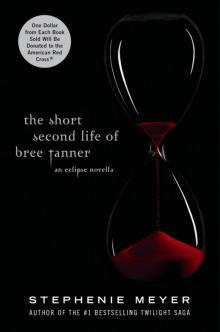 The Short Second Life of Bree Tanner
The Short Second Life of Bree Tanner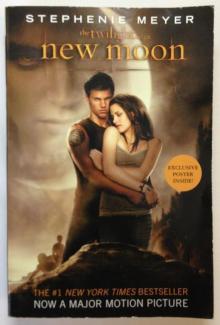 The Twilight Saga 2: New Moon
The Twilight Saga 2: New Moon Prom Nights from Hell
Prom Nights from Hell The Short Second Life of Bree Tanner: An Eclipse Novella
The Short Second Life of Bree Tanner: An Eclipse Novella The Twilight Saga 4: Breaking Dawn
The Twilight Saga 4: Breaking Dawn The Venetian Betrayal
The Venetian Betrayal The Host
The Host The Twilight Saga 3: Eclipse
The Twilight Saga 3: Eclipse The Twilight Saga 5: Midnight Sun
The Twilight Saga 5: Midnight Sun Twilight
Twilight Midnight Sun
Midnight Sun The Twilight Saga: The Official Illustrated Guide
The Twilight Saga: The Official Illustrated Guide The Alexandria Link
The Alexandria Link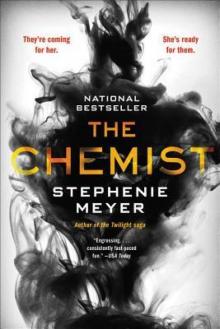 The Chemist
The Chemist Eclipse
Eclipse Twilight Tenth Anniversary Edition
Twilight Tenth Anniversary Edition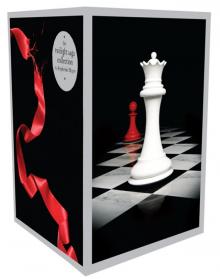 The Twilight Saga Collection
The Twilight Saga Collection Fascination
Fascination RÉVÉLATION
RÉVÉLATION TENTATION
TENTATION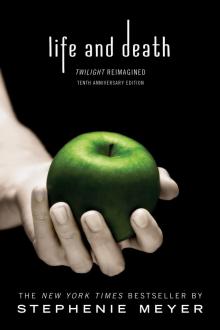 Life and Death
Life and Death HÉSITATION
HÉSITATION